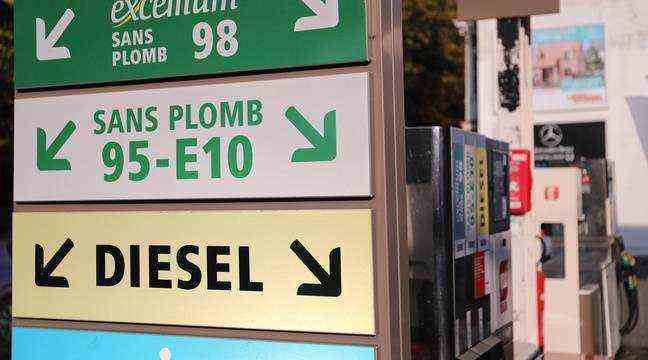Fuels have been going from record to record since the beginning of the year and, for the first time, diesel exceeded 1.60 euros per litre, driven by rising oil prices. And the situation should not improve. The surge in fuel prices is likely to continue, as tensions on the energy markets remain intense. Explanations.
How is the price of fuel made up?
A little more than a third of the price of fuel corresponds to the price of oil and more than half is linked to taxation, between VAT and the domestic consumption tax on energy products (TICPE). According to the French Union of Petroleum Industries (Ufip), for a liter of diesel at 1.62 euros, the taxes amount to nearly 88 cents, or more than 54% of the total price, a proportion slightly down since 2007. On 95 unleaded gasoline, taxes represent 57% of the price at the pump. Concretely, the VAT is applied a first time before the TICPE, then a second time on the amount including the TICPE. The consequence for the consumer is a multiplier effect: a rise in the price of oil leads to an increase in the cost of the two taxes, which at the same time increase the price at the pump more strongly.
Can prices continue to rise?
At over $88 a barrel, Brent crude hit its highest level since 2014 on Tuesday and the trend could continue. According to Carsten Fritsch, an analyst at Commerzbank, geopolitical tensions in the Middle East, particularly linked to the Yemeni conflict, and production that remains below demand continue to drive prices up. In question, the inability of several OPEC + member states to reach the quotas set during the last negotiations within the organization despite growing demand, according to Tamas Varga, analyst at PVM Energy.
Oil remains however still far from its absolute record, reached in 2008, in full crisis of the subprimes, with a barrel of Brent which had exceeded 146 dollars in August 2008, before falling at the beginning of 2009 around 45 dollars.
What room for maneuver does the government have?
If he refuses to touch taxation in this area, they are in fact very small. In mid-October, when the price of diesel was 10 cents lower than currently, the Minister for Ecological Transition, Barbara Pompili, had called on distributors to “make a gesture (…) by reducing their margins”. The president of Ufip then underlined that the net margin of distributors “is around one cent per liter”. The executive had finally chosen a tax-free “middle class allowance” of 100 euros, which was paid in December to 38 million French people earning less than 2,000 euros net per month. A check that aims to respond to rising prices in general.
Lowering taxes is however complicated for the government, in a context of slippage in public finances, largely weighed down by the support of the economy in a period of pandemic. However, the TICPE is one of the main tax revenues of the State and an increase in the price of oil necessarily improves its yield, a godsend for the budget. In the early 2000s, the government of socialist Lionel Jospin set up a “floating” TIPP (ancestor of the TICPE), which smoothed the price of fuel in the event of a rise in oil prices. If the idea has regularly returned to public debate in recent years, it is not on the agenda.
Will the government take further action?
Faced with the rise in energy prices, the Minister of the Economy Bruno Le Maire assured, this Wednesday on BFMTV / RMC, not to close “no door” to new measures, while underlining the cost of those already put in place. implemented. “The inflation allowance, the energy check, what we have done on EDF, what we are doing to cap gas prices: the bill for all of these measures is 15 billion euros already committed by the state to protect the French,” said the minister.
Asked about the advisability of lowering the VAT rate on gasoline to 5.5%, against 20% currently, Bruno Le Maire was cautious. “Ten euro cents less per liter, on a full 50 liters, it’s five euros less” for the consumer but “5 billion” in lost tax revenue for the State, he assured .
“We have to measure the costs that this represents, the loss of earnings for the State, for public services”, added the minister, who had already shown himself hostile on several occasions to such a measure. “I will continue to monitor fuel prices, see if additional measures are necessary. We are constantly adjusting the systems,” said Bruno Le Maire.

